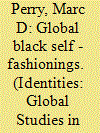| Srl | Item |
| 1 |
ID:
085235


|
|
|
|
|
| Publication |
2008.
|
| Summary/Abstract |
This essay examines how the "black" racial significance of hip hop culture is received, interpreted, and redeployed within the Afro-Atlantic world. Beyond questions of cultural consumption and reproduction, it is argued that hip hop's expanding global reach has facilitated the contemporary making and moving of black diasporic subjects themselves. Here, African descendant youth in an array of locales use the performative contours of hip hop to mobilize notions of black-self in ways that are at one time both contestive and transcendent of nationally bound racial framings. Hip hop in this way can be seen as enabling a current global (re)mapping of black political imaginaries via social dynamics of diaspora. In pursuing this argument, this essay looks toward hip hop movements in Brazil, Cuba, and South Africa as compelling, yet varying examples of how transnationally attuned identities of blackness are marshaled in the fashioning of diasporic subjects through hip hop.
|
|
|
|
|
|
|
|
|
|
|
|
|
|
|
|
| 2 |
ID:
098378


|
|
|
|
|
| Publication |
2010.
|
| Summary/Abstract |
Over half a million ethnic Koreans found themselves in the post-Soviet states after the collapse of the Soviet Union in 1991. Caught up in the political and economic transformation of these countries, they faced the necessity of constructing their own strategies for survival and resettlement. Briefly explaining the formation of Russian Koreans' primary diasporas in their historical context and focusing on the diasporians' mobility in the post-Soviet era, this study will show how the destruction of the constraints of the authoritarian period together with the collapse of the regime itself affects diasporas and enlarges the spaces available to them. Addressing the issue of the diaporians' relationship to place and space, this article attempts to contribute to the conceptualization of the construction of new diasporic spaces and the discussion of mobility decision making, suggesting that diasporians, who had been long deprived by various constraints of the right to choose their place of residence, have comparatively high mobility and construct newer, much more sophisticated and far-flung diasporic layers.
|
|
|
|
|
|
|
|
|
|
|
|
|
|
|
|